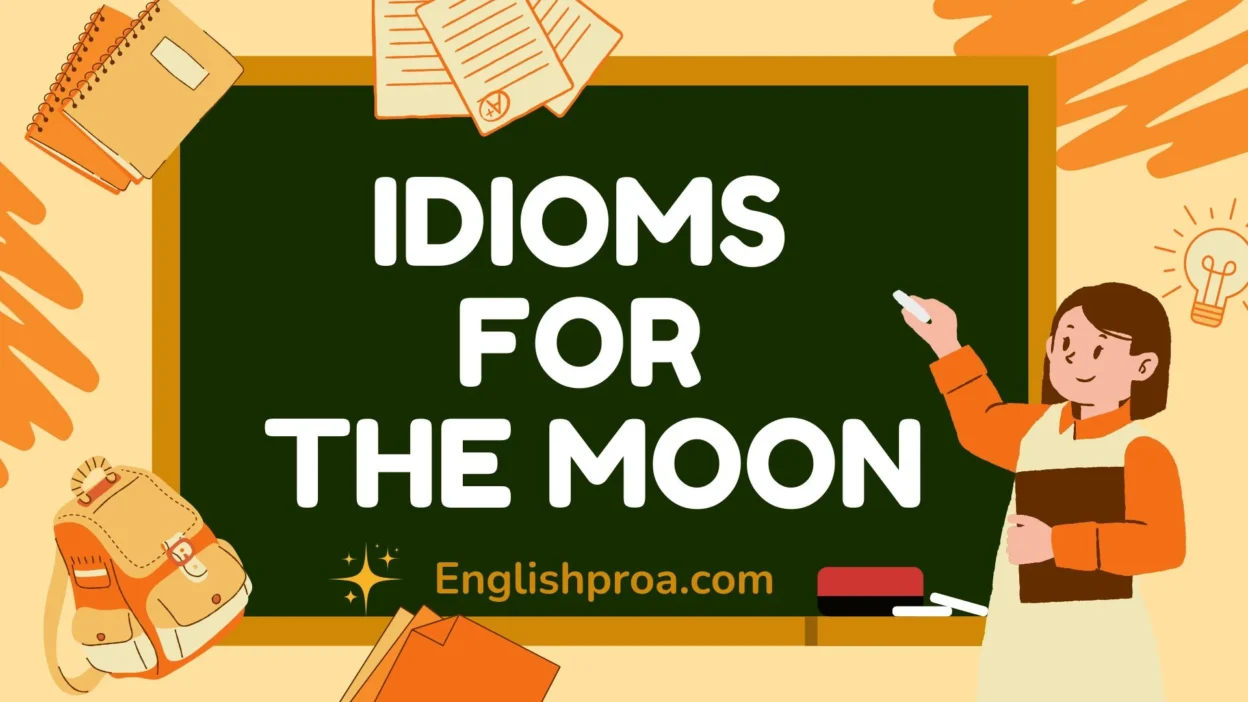The moon has always captured human imagination with its enchanting glow, mysterious phases, and ethereal beauty. It represents a source of wonder, dreams, and even wisdom. Many idioms and phrases reference the moon, providing creative ways to express emotions and experiences. Whether you’re talking about reaching for your dreams or describing something incredibly rare, moon-related idioms bring depth and emotion to your language.
In this article, we’ll explore 30 idioms for the moon that will help you add a touch of poetry to your everyday communication. From feelings of hope to moments of peace and wonder, these idioms will allow you to articulate your thoughts with care and warmth. Each idiom is explained in a conversational tone to help you better understand and use them in the right context.
1. Over the moon
Meaning: Extremely happy or delighted.
In a sentence: “She was over the moon when she heard she had won the scholarship.”
Best Use: Use it to describe feelings of great joy or excitement.
Not Use: Avoid using it in serious, professional settings unless expressing genuine, overwhelming happiness.
Other Ways to Say: “Ecstatic,” “Thrilled,” “On cloud nine.”
2. Once in a blue moon
Meaning: Something that happens very rarely.
In a sentence: “We only go out to dinner like this once in a blue moon.”
Best Use: Use this phrase to express rarity or infrequent events.
Not Use: Don’t use it for things that happen frequently, even if it seems unusual.
Other Ways to Say: “Rarely,” “Once in a lifetime.”
3. Moonlighting
Meaning: Working a second job, especially secretly.
In a sentence: “She has been moonlighting as a writer while keeping her regular job.”
Best Use: Use it when referring to secret side projects or jobs people do outside of their main job.
Not Use: Avoid using it when referring to someone’s main job.
Other Ways to Say: “Side hustle,” “Freelancing.”
4. Many moons ago
Meaning: A long time ago.
In a sentence: “We met many moons ago when we were in college.”
Best Use: Use this idiom when reminiscing about the distant past.
Not Use: Avoid using it for recent events or things that happened a short time ago.
Other Ways to Say: “A long time ago,” “In the distant past.”
5. Shoot for the moon
Meaning: To aim for an ambitious or unrealistic goal.
In a sentence: “If you’re going to shoot for the moon, you may as well go for something that truly excites you.”
Best Use: Use this when encouraging someone to set big dreams or high ambitions.
Not Use: Don’t use it for more practical goals.
Other Ways to Say: “Dream big,” “Go for gold.”
6. Moonstruck
Meaning: Completely enchanted or infatuated.
In a sentence: “He was absolutely moonstruck by her beauty.”
Best Use: Use it to describe someone who is deeply in love or enchanted by something or someone.
Not Use: Avoid using it for casual infatuation or when referring to something that isn’t captivating.
Other Ways to Say: “Enchanted,” “Captivated.”
7. Like a bat out of hell
Meaning: Moving very quickly or recklessly.
In a sentence: “He drove like a bat out of hell to get to the hospital on time.”
Best Use: Use it when describing someone’s speed or reckless actions.
Not Use: Don’t use it to describe calm or calculated actions.
Other Ways to Say: “At breakneck speed,” “In a hurry.”
8. Under the moon
Meaning: Something that is universally true or applies to everyone.
In a sentence: “There’s nothing under the moon that can stop us now.”
Best Use: Use it to express a universal truth or something that is valid for all.
Not Use: Don’t use it when discussing something that only applies to a specific group.
Other Ways to Say: “For all,” “Across the world.”
9. The moon is made of green cheese
Meaning: A statement that is absurd or unbelievable.
In a sentence: “Saying that they discovered a new island in the Arctic is like saying the moon is made of green cheese.”
Best Use: Use it humorously to dismiss something as far-fetched.
Not Use: Avoid using it for plausible or rational statements.
Other Ways to Say: “Highly unlikely,” “Impossible.”
10. Moondust
Meaning: Something delicate, light, or elusive.
In a sentence: “Her moondust personality left everyone captivated and lighthearted.”
Best Use: Use it to describe something that is fragile, dreamy, or hard to catch.
Not Use: Don’t use it for something solid or practical.
Other Ways to Say: “Ethereal,” “Gossamer.”
11. In the light of the moon
Meaning: In the calm and gentle glow of the moon.
In a sentence: “We took a walk in the light of the moon, and it felt peaceful.”
Best Use: Use it to describe a calm or romantic atmosphere.
Not Use: Avoid using it for intense or overwhelming situations.
Other Ways to Say: “Under the moonlight,” “By moonbeam.”
12. To promise the moon
Meaning: To offer something unrealistic or unachievable.
In a sentence: “He promised her the moon, but he couldn’t even deliver a decent dinner.”
Best Use: Use it when someone makes unrealistic promises.
Not Use: Avoid using it for practical promises that are within reach.
Other Ways to Say: “Make grand promises,” “Offer the stars.”
13. Moonshine
Meaning: Homemade or illicitly distilled alcohol.
In a sentence: “They were caught selling moonshine from an underground distillery.”
Best Use: Use it to refer to illegal alcohol or underground activities.
Not Use: Avoid using it in a context related to standard, legal beverages.
Other Ways to Say: “Illicit liquor,” “Homemade brew.”
14. The man in the moon
Meaning: A figure or face that seems to appear in the moon.
In a sentence: “Children love imagining the man in the moon smiling down at them.”
Best Use: Use this idiom in stories or when talking to children about the moon.
Not Use: Don’t use it for scientific or serious moon discussions.
Other Ways to Say: “Face in the moon,” “Moon’s visage.”
15. Once in a blue moon
Meaning: Something very rare, often used to describe infrequent events.
In a sentence: “He once in a blue moon visits his family on holidays.”
Best Use: Use it for rare occurrences or things that don’t happen often.
Not Use: Avoid using it for daily or frequent events.
Other Ways to Say: “Once in a while,” “Every so often.”
16. Full moon fever
Meaning: The idea that people act differently or erratically during a full moon.
In a sentence: “She had full moon fever, staying up all night, rearranging the house.”
Best Use: Use it when describing strange behavior that you attribute to a full moon.
Not Use: Avoid using it to describe calm or logical actions.
Other Ways to Say: “Lunar madness,” “Moon-induced chaos.”
17. Moon over
Meaning: To gaze or daydream about something, often in a wistful or romantic way.
In a sentence: “He just sat there, moon over her picture, lost in thoughts.”
Best Use: Use it to express longing, daydreaming, or romantic thoughts.
Not Use: Avoid using it for casual or non-emotional moments.
Other Ways to Say: “Gaze fondly at,” “Dream about.”
18. Howl at the moon
Meaning: To express frustration or to engage in behavior that’s seen as pointless or dramatic.
In a sentence: “He was howling at the moon, ranting about his unfair treatment at work.”
Best Use: Use it when describing someone who is expressing frustration or acting dramatically.
Not Use: Avoid using it for calm, reasoned discussions.
Other Ways to Say: “Vent angrily,” “Rant and rave.”
19. A moonlit night
Meaning: A night illuminated by the light of the moon, often romanticized.
In a sentence: “The beach was so peaceful under a moonlit night, it felt magical.”
Best Use: Use it to describe romantic, calm, or beautiful scenes.
Not Use: Avoid using it for daytime or non-romantic settings.
Other Ways to Say: “Moonlight night,” “Under the stars.”
20. The moon’s out
Meaning: It is nighttime or getting late.
In a sentence: “It’s getting late, I think the moon’s out now.”
Best Use: Use it when commenting on the time, particularly late evening.
Not Use: Avoid using it during the day or early evening.
Other Ways to Say: “It’s nighttime,” “It’s late.”
FAQs
- What does “shoot for the moon” mean?
“Shoot for the moon” means to aim for a high goal or ambition. - How do you use “over the moon” in a sentence?
You can use it to express extreme happiness: “I was over the moon when I got the job offer.” - What does “once in a blue moon” refer to?
It refers to something that happens very rarely or infrequently. - What’s the origin of “moonlighting”?
“Moonlighting” originated when workers used to take on second jobs at night, typically by the light of the moon. - Can “moonstruck” only refer to love?
While often related to infatuation or love, it can also be used to describe someone who is captivated by something or someone.
Conclusion
Exploring the moon’s many idioms helps us appreciate its profound impact on language and emotion. Whether expressing joy, wonder, or frustration, these 30 idioms add depth and warmth to our everyday conversations. Use them thoughtfully to communicate your feelings with care, and watch how these phrases bring your words to life.





